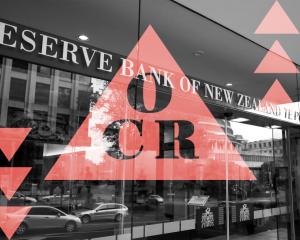
Fuel prices are set to determine the airline's performance in 2009, with chief executive Rob Fyfe saying global jet fuel had to stay below $US140 ($NZ201) per barrel for Air New Zealand to deliver a similar profit next year.
Despite the prospect of tough times ahead, Mr Fyfe was adamant Air New Zealand, being small and flexible, could offset those challenges by introducing more fuel-efficient craft and new in-flight products "to build a platform for future growth in existing and new markets".
The share price of Air New Zealand, 76% owned by the Government, yesterday traded down 2c at around $1.20 following the release of the report.
The 8.5c dividend is up 0.5c on last year.
ABN Amro Craigs broker Peter McIntyre said the result was in line with expectations, with a successful fuel-hedging gain of $159 million underpinning the result.
However, more importantly, it was the outlook and impact of jet fuel prices that would set the tone for 2009.
"You should expect to see Air New Zealand being aggressive with its transtasman travel," Mr McIntyre said.
He noted, while Air New Zealand had little capital expenditure for 2009, during 2010-11, it would begin a major capital expenditure programme, bringing four 777-300s into service - a point also noted by Mr Fyfe - with the aircraft offering greater fuel efficiency.
Globally, airline losses had amounted to more than $US6 billion and 24 airlines had failed since January.
Air New Zealand was experiencing "rising costs and softening demand", with the challenges of the second half of 2008 continuing through to the 2009 year, he said.
Asked if New Zealand was big enough for three airlines, Mr Fyfe said Air New Zealand's yields had decreased and the market needed to "stabilise" or "one player exit the [domestic] market".
At present, only Air New Zealand and Qantas operate transtasman flights, but Emirates and possibly Richard Branson's Pacific Blue are entering the market.
"If there is the proposed capacity increase of 10% to 11% in the next six to nine months, that (transtasman) market will very quickly become a bloodbath," Mr Fyfe said.
He acknowledged the increased competition would be to the benefit of consumers and was what prompted Air New Zealand to introduce new services and on-board facilities.
Air New Zealand patronage increased 5.6% on the previous year and it carried 13.2 million passengers.
Overall, Air New Zealand's fuel prices surged 33% during the year, with its net fuel cost increasing by $300 million to a total of $1.12 billion.
Had it not gained $159 million from forward fuel contract hedges, its net fuel cost would have increased by $459 million.
Next year, its fuel bill was projected at $1.7 billion, if prices remained below $US140 per barrel, compared with a $500 million fuel bill five years ago, Mr Fyfe said.
While its operating revenue was up 9.1% at $4.7 billion, its after-tax profit was down 1% on the previous year at $218.2 million and its normalised earnings before unusual items down 24% on the previous year at $197 million.
Mr Fyfe said the fall in after-tax profit had been accentuated by new accounting standards which required unrealised future contract hedge gains to be included in this year's full-year accounts.
On the question of cost cutting and gaining efficiencies, including a 4% reduction in long-haul services with smaller craft, Mr Palmer said job cuts were "unlikely", given the global shortage of pilots and engineering staff and Air New Zealand wanted to emerge from the present economic cycle with its technical staffing intact.












